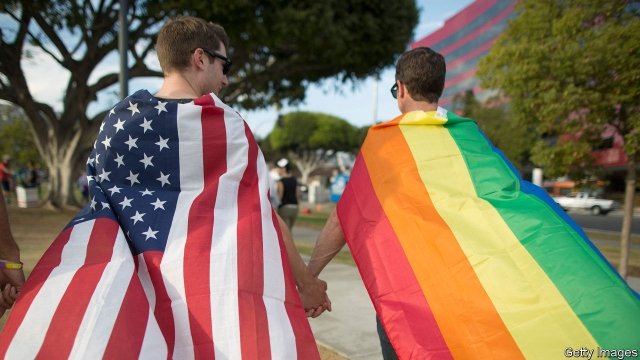New research suggests that a more equal society is a more productive one
IT IS OFTEN said that rapid social change is behind the reactionary politics of America’s new right: older white heterosexual men feel their traditional role is under attack. But while they may have lost privilege, they may have gained from productivity. Two recent papers suggest that declining discrimination has been a boon for the economy.
Dario Sansone, an economist at Georgetown University, studied the effect of the legalisation of gay marriage on discrimination and the labour market in America’s states. In 2004, the Massachusetts Supreme Court made gay marriage legal; Connecticut followed in 2008 and Iowa in 2009. A growing number of states saw legalisation over the following years until in 2015, in Obergefell v Hodges, the Supreme Court ruled that same-sex marriage was a right nationwide.
This shift toward equal legal status appears to have moved popular attitudes towards equality. In a study of Google search patterns across states and over time, Mr Sansone found that searches for Leviticus, the Old Testament book that commands, “You shall not lie with a man as with a woman,” dropped after legalisation, as did searches for “sodomy” and “faggot.” He then used the staggered introduction of gay marriage alongside census data to estimate the impact on employment rates. The legalisation of same-sex marriage was followed by a 2.3% rise in the probability that both partners in a gay or lesbian relationship were working, alongside an increase in hours worked and a reduction in self-employment.
Gay marriage might have been expected to reduce labour force participation. Mr Sansone notes that there are 1,138 federal statutory provisions alone that provide benefits rights and privileges contingent upon marriage, from tax and inheritance laws to health coverage. And the ability to get health coverage under a spouse’s plan, for example, might have encouraged some newlyweds to quit a job they were only keeping for the benefits. It might also have encouraged more couples to start a family, potentially increasing the number of stay-at-home parents.
But the research suggests that the effects of reduced workplace discrimination trumped those of increased access to benefits. While legalisation did somewhat improve access to employer-sponsored health care, it had an insignificant effect on the number of children in gay and lesbian households. And the increase in employment after legalisation applied to both married and unmarried same-sex partners.
That study complements a recent National Bureau of Economic Research paper by Chang-Tai Hsieh and colleagues that looked at the economic impact of growing workplace equality over the last half-century with regard to race and gender. The paper notes that in 1960, 94% American doctors and lawyers were white men. Today, that proportion is 64%. The researchers estimate that the productivity impact of moving previously excluded African Americans and women with innate talents for particular professions into those professions could account for one quarter of the increase in output per person in America between 1960 and 2010.
Discrimination has long been framed primarily as an issue of equity. These new studies suggest the extent to which it is also an issue of efficiency. Those doing the discriminating also lose out, from a smaller labour force in which too many people are doing the wrong jobs.
Courtesy: The Economist

The High Asia Herald is a member of High Asia Media Group — a window to High Asia and Central Asia

